Mercedes B Class vs Nissan Leaf - Differences and prices compared
Compare performance (238 HP vs 217 HP), boot space and price (33100 £ vs 30800 £ ) at a glance. Find out which car is the better choice for you – Mercedes B Class or Nissan Leaf?
Costs and Efficiency:
When it comes to price and running costs, the biggest differences usually appear. This is often where you see which car fits your budget better in the long run.
Nissan Leaf has a slight advantage in terms of price – it starts at 30800 £ , while the Mercedes B Class costs 33100 £ . That’s a price difference of around 2358 £.
As for electric range, the Nissan Leaf performs decisively better – achieving up to 385 km, about 302 km more than the Mercedes B Class.
Engine and Performance:
Under the bonnet, it becomes clear which model is tuned for sportiness and which one takes the lead when you hit the accelerator.
When it comes to engine power, the Mercedes B Class has a minimal edge – offering 238 HP compared to 217 HP. That’s roughly 21 HP more horsepower.
In acceleration from 0 to 100 km/h, the Mercedes B Class is barely noticeable quicker – completing the sprint in 6.50 s, while the Nissan Leaf takes 6.90 s. That’s about 0.40 s faster.
In terms of top speed, the Mercedes B Class performs clearly perceptible better – reaching 250 km/h, while the Nissan Leaf tops out at 157 km/h. The difference is around 93 km/h.
There’s also a difference in torque: Mercedes B Class pulls noticeable stronger with 450 Nm compared to 340 Nm. That’s about 110 Nm difference.
Space and Everyday Use:
Whether family car or daily driver – which one offers more room, flexibility and comfort?
Both vehicles offer seating for 5 people.
In curb weight, Mercedes B Class is somewhat lighter – 1405 kg compared to 1580 kg. The difference is around 175 kg.
In terms of boot space, the Mercedes B Class offers to a small extent more room – 455 L compared to 394 L. That’s a difference of about 61 L.
In maximum load capacity, the Mercedes B Class performs clearly better – up to 1540 L, which is about 750 L more than the Nissan Leaf.
When it comes to payload, Mercedes B Class noticeable takes the win – 550 kg compared to 415 kg. That’s a difference of about 135 kg.
Who comes out on top?
Overall, the Nissan Leaf shows itself to be is largely superior and secures the title of DriveDuel Champion.
It convinces with the more balanced overall package and proves to be the more versatile choice for everyday use.

Nissan Leaf
Costs and Consumption
View detailed analysis
Engine and Performance
View detailed analysis
Dimensions and Body
View detailed analysis
Mercedes B Class
The Mercedes B-Class is a smart, grown-up compact people carrier that dresses everyday practicality in a near‑premium polish, perfect for buyers who want comfort and a classy badge without the theatrics. It won’t set your pulse racing on a back road, but it will make school runs, commutes and grocery hauls feel pleasantly civilized — a reliable, slightly posh companion for real life.
details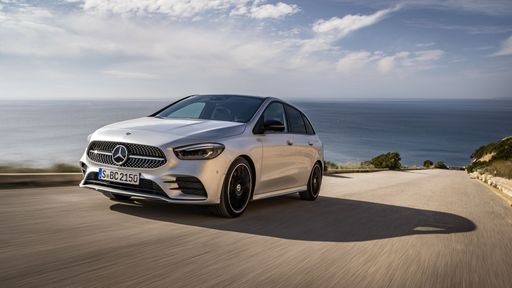
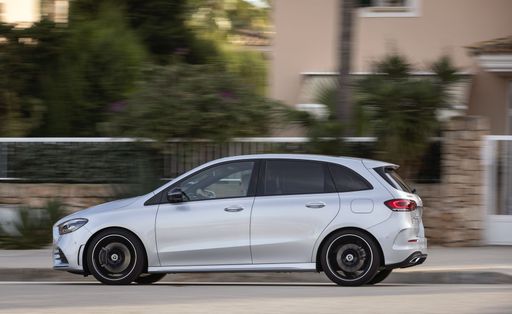
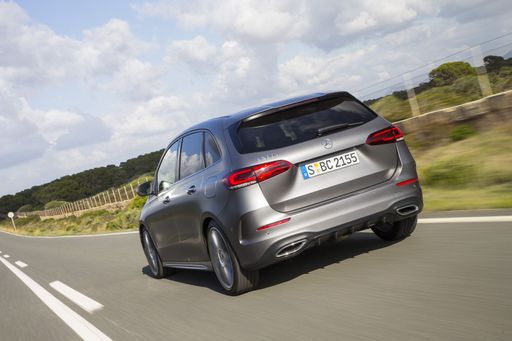
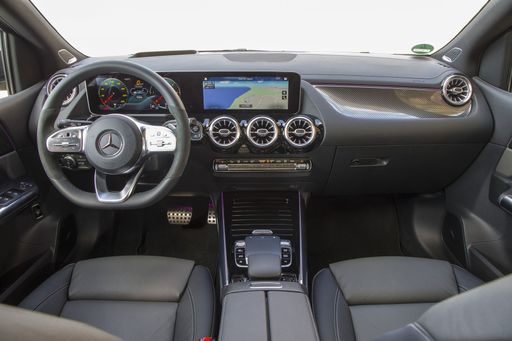
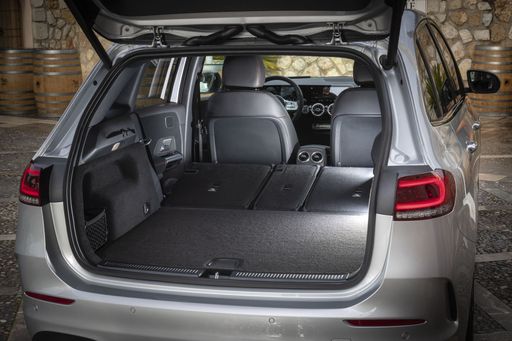
Nissan Leaf
The Nissan Leaf is a practical, easygoing electric hatch that turns daily commutes into a quiet, effortless affair while offering more cabin space than it lets on. It’s a sensible, wallet-friendly step into electrification for buyers who value comfort and simplicity over sporty drama, though those chasing long-distance thrills might look elsewhere.
details



Costs and Consumption |
|
|---|---|
|
Price
33100 - 52500 £
|
Price
30800 - 37200 £
|
|
Consumption L/100km
2.5 - 6.9 L
|
Consumption L/100km
-
|
|
Consumption kWh/100km
-
|
Consumption kWh/100km
16.7 - 17.8 kWh
|
|
Electric Range
83 km
|
Electric Range
270 - 385 km
|
|
Battery Capacity
12.90 kWh
|
Battery Capacity
39 - 59 kWh
|
|
co2
56 - 156 g/km
|
co2
0 g/km
|
|
Fuel tank capacity
35 - 51 L
|
Fuel tank capacity
-
|
Dimensions and Body |
|
|---|---|
|
Body Type
MPV
|
Body Type
Hatchback
|
|
Seats
5
|
Seats
5
|
|
Doors
5
|
Doors
5
|
|
Curb weight
1405 - 1745 kg
|
Curb weight
1580 - 1756 kg
|
|
Trunk capacity
405 - 455 L
|
Trunk capacity
385 - 394 L
|
|
Length
4419 mm
|
Length
4490 mm
|
|
Width
1796 mm
|
Width
1788 mm
|
|
Height
1562 mm
|
Height
1540 - 1545 mm
|
|
Max trunk capacity
1440 - 1540 L
|
Max trunk capacity
790 L
|
|
Payload
505 - 550 kg
|
Payload
384 - 415 kg
|
Engine and Performance |
|
|---|---|
|
Engine Type
Plugin Hybrid, Petrol MHEV, Diesel
|
Engine Type
Electric
|
|
Transmission
Automatic
|
Transmission
Automatic
|
|
Transmission Detail
Dual-Clutch Automatic
|
Transmission Detail
Reduction Gearbox
|
|
Drive Type
Front-Wheel Drive, All-Wheel Drive
|
Drive Type
Front-Wheel Drive
|
|
Power HP
116 - 238 HP
|
Power HP
150 - 217 HP
|
|
Acceleration 0-100km/h
6.5 - 10 s
|
Acceleration 0-100km/h
6.9 - 7.9 s
|
|
Max Speed
200 - 250 km/h
|
Max Speed
144 - 157 km/h
|
|
Torque
200 - 450 Nm
|
Torque
320 - 340 Nm
|
|
Number of Cylinders
4
|
Number of Cylinders
-
|
|
Power kW
85 - 175 kW
|
Power kW
110 - 160 kW
|
|
Engine capacity
1332 - 1991 cm3
|
Engine capacity
-
|
General |
|
|---|---|
|
Model Year
2024 - 2025
|
Model Year
2019
|
|
CO2 Efficiency Class
B, D, E, F
|
CO2 Efficiency Class
A
|
|
Brand
Mercedes-Benz
|
Brand
Nissan
|
What drivetrain options does the Mercedes B Class have?
The Mercedes B Class is offered with Front-Wheel Drive or All-Wheel Drive.




